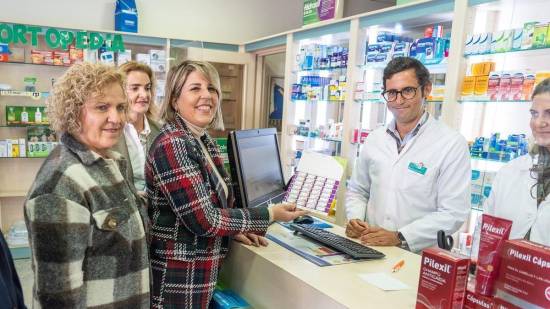
An intervention programme to guarantee medication for the elderly who live alone and without family support. This is a pioneering initiative in the social and health care field that has been promoted by the City Council and which ensures medication control by means of the Personal Dispensing System (SPD), developed by the Official College of Pharmacists of the Region of Murcia (COFRM) and which aims to improve therapeutic adherence to treatments and the rational use of medicines.
The project, which is being developed in its pilot phase with 20 patients, involves the City Council, the COFRM and the Red Cross, and «is part of the actions aimed at combating the unwanted loneliness of the elderly», according to the mayor, Noelia Arroyo, who stressed «the effort we are making to achieve a broad and solid social support network for the more than 8,600 people over 65 who live in Cartagena alone and without family support».
For the councillor, «unwanted loneliness is a public health problem that affects older people in particular and leads to situations of isolation with serious health consequences». For this reason, the project «was created to help the elderly to manage their illness, because the vast majority suffer from a chronic illness and are polymedicated».

Improving therapeutic adherence
The three institutions involved in the project held a coordination meeting on Monday, chaired by the mayoress and attended by the secretary general of the COFRM, María Jesús Rodríguez, and the president of the Red Cross, Andrés Ros, in which it was made clear that the elderly who do not have family support have great difficulty in administering the treatments prescribed by their doctors, because they get confused and forget, which results in the abandonment of treatment or even in overmedication as a result of confusion.
Through this initiative, the City Council would assume the cost of the service for elderly people with limited economic resources, while the pharmacies would carry out the initial interview with the user, verify the medicines they need, discard the expired ones and prepare the personalised dosage system (blister packs and/or pill dispensers). They will also check the patient’s adherence to the treatment. For its part, the Red Cross will monitor the beneficiary and intervene with actions aimed at improving the therapeutic regimen, healthy habits and avoiding risky behaviour. This follow-up will be both face-to-face and by telephone.
The protocol established for the pilot phase establishes that any of the three entities linked to the project will be able to detect or attract potential users. Each case will be evaluated by a tripartite commission that will decide whether or not it meets the requirements to form part of the programme.
Pharmaceutical spending agreement
The meeting also served to sign the agreement between the City Council and the COFRM, by means of which the Cartagena City Council assumes the payment of medicines for people without resources. In this way, the beneficiaries of the programme will be able to collect the medicines prescribed by their doctor from the pharmacies completely free of charge.
Arroyo indicated that 40,000 euros will be earmarked for this purpose in 2024, and said that by September 2023, 1,764 prescriptions amounting to 17,416 euros had been paid, corresponding to the treatment of 496 people.
The mayoress pointed out that «we ensure access to treatment, but also that they do not abandon it» and explained that «many of the beneficiaries are chronically ill and require medication on a permanent basis. Adherence to treatment is fundamental for the illness and in this way we guarantee that they are relieved of the burden of paying for medication».
The Department of Social Services accredits the beneficiaries of the service with a document that they have to present at the pharmacy together with the treatment given to them by their doctor.
For her part, the Secretary General of the College of Pharmacists, María Jesús Rodríguez, explained that «pharmaceutical advice and help with adherence to treatment saves many lives, and more and more every day. We exercise this challenge and this responsibility from a position of proximity, because we are the health professionals who are closest to the citizen».
According to the Regional Ministry of Health, 95% of the population of the Region of Murcia has a pharmacy less than 200 metres away, with an excellent professional at the front who carries out his or her work continuously.
